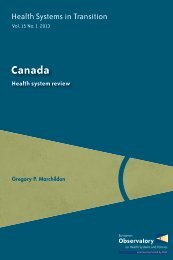Health Systems in Transition - Hungary - World Health Organization ...
Health Systems in Transition - Hungary - World Health Organization ...
Health Systems in Transition - Hungary - World Health Organization ...
You also want an ePaper? Increase the reach of your titles
YUMPU automatically turns print PDFs into web optimized ePapers that Google loves.
158<br />
<strong>Health</strong> systems <strong>in</strong> transition <strong>Hungary</strong><br />
In addition to the listed cash benefits, the central government, the NPIFA and<br />
the NHIFA cover a wide range of benefits, entitlement to which is not related<br />
to the socioeconomic status of recipients. These <strong>in</strong>clude family benefits, such<br />
as pregnancy and conf<strong>in</strong>ement benefits, maternity benefits, child care benefits<br />
and allowance, and child rais<strong>in</strong>g support and family allowance; pensions, such<br />
as old age and disability pension; and <strong>in</strong>come replacement <strong>in</strong> the event of illness,<br />
such as sick pay (HCSO, 2010f). The SHA classification considers households<br />
as providers of home care (International <strong>Health</strong> Accounts Team, 2011). The<br />
nurs<strong>in</strong>g allowance is a cash benefit bestowed by local governments to support<br />
care provided by laypeople, <strong>in</strong>clud<strong>in</strong>g relatives, to <strong>in</strong>dividuals with severe<br />
disabilities or chronically ill children under 18 years of age (1993/1).<br />
In-k<strong>in</strong>d benefits take two ma<strong>in</strong> forms: (1) <strong>in</strong>-k<strong>in</strong>d benefits for impoverished<br />
people and (2) <strong>in</strong>-k<strong>in</strong>d benefits for people with disabilities (services of personal<br />
social care). Benefits for impoverished people can take the form of either<br />
reimbursement of actual expenses or the provision of services <strong>in</strong>-k<strong>in</strong>d. The<br />
two ma<strong>in</strong> health care related <strong>in</strong>-k<strong>in</strong>d benefits are pharmaceutical co-payment<br />
exemptions and eligibility for health care services. In case of the former, the<br />
government covers the user charges for essential drugs and medical aids and<br />
prostheses. For the latter, impoverished people who otherwise would not<br />
have HIF coverage become eligible for health care. In both cases, the local<br />
government tests for eligibility and issues an identity card to the recipients<br />
certify<strong>in</strong>g it to the provider. The government <strong>in</strong> power from 2006 to 2010<br />
changed the rules of eligibility and utilization to decrease the abuse of the<br />
system (see section 5.6). The user charges exemption scheme (közgyógy) had<br />
396 recipients per 10 000 <strong>in</strong>habitants <strong>in</strong> 2007 (Table 5.2). The Public Foundation<br />
for the Homeless is a charity that provides health care for homeless people<br />
<strong>in</strong> both family doctor practices and mobile units. The Foundation also runs<br />
two residential <strong>in</strong>stitutions and two day-shelters (2004/3, 2004/8). There is<br />
another public foundation established by the government and the municipality<br />
of Budapest that is dedicated to serv<strong>in</strong>g the homeless <strong>in</strong> the capital (2003/14).<br />
In-k<strong>in</strong>d benefits for people with disabilities <strong>in</strong>clude primary social care<br />
provided at home and <strong>in</strong> the community (<strong>in</strong>clud<strong>in</strong>g social cater<strong>in</strong>g and<br />
domestic help) and special social care <strong>in</strong> residential <strong>in</strong>stitutions (<strong>in</strong>clud<strong>in</strong>g<br />
short- and long-term residential care and rehabilitation). Between 2002 and<br />
2007, the classification of services changed and their scope broadened (Mester,<br />
2010). Five new service types were <strong>in</strong>troduced (alarm-system-based domestic<br />
assistance, community care for people with cognitive impairment or people<br />
with addictions, street social work for the homeless, and social support service
















